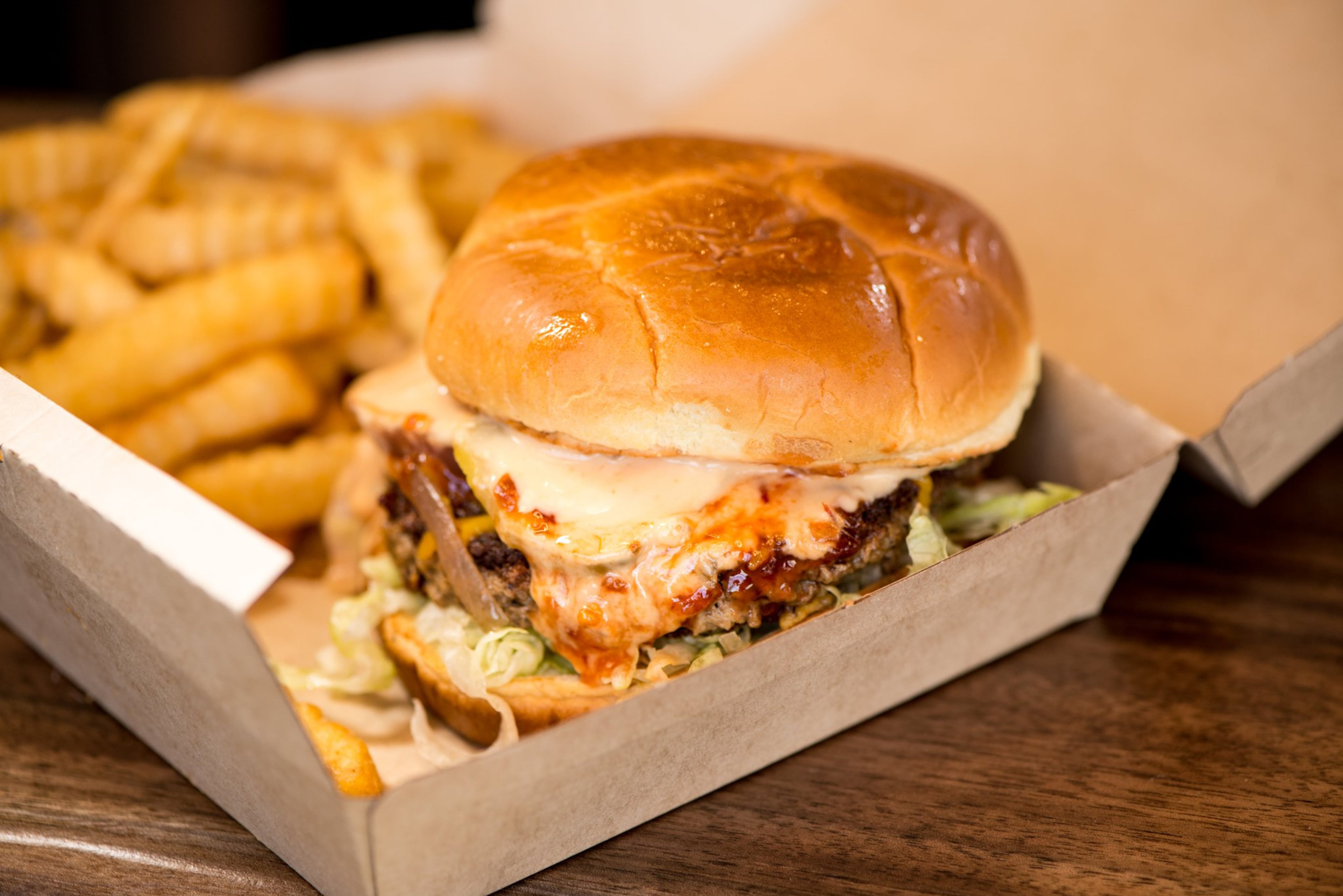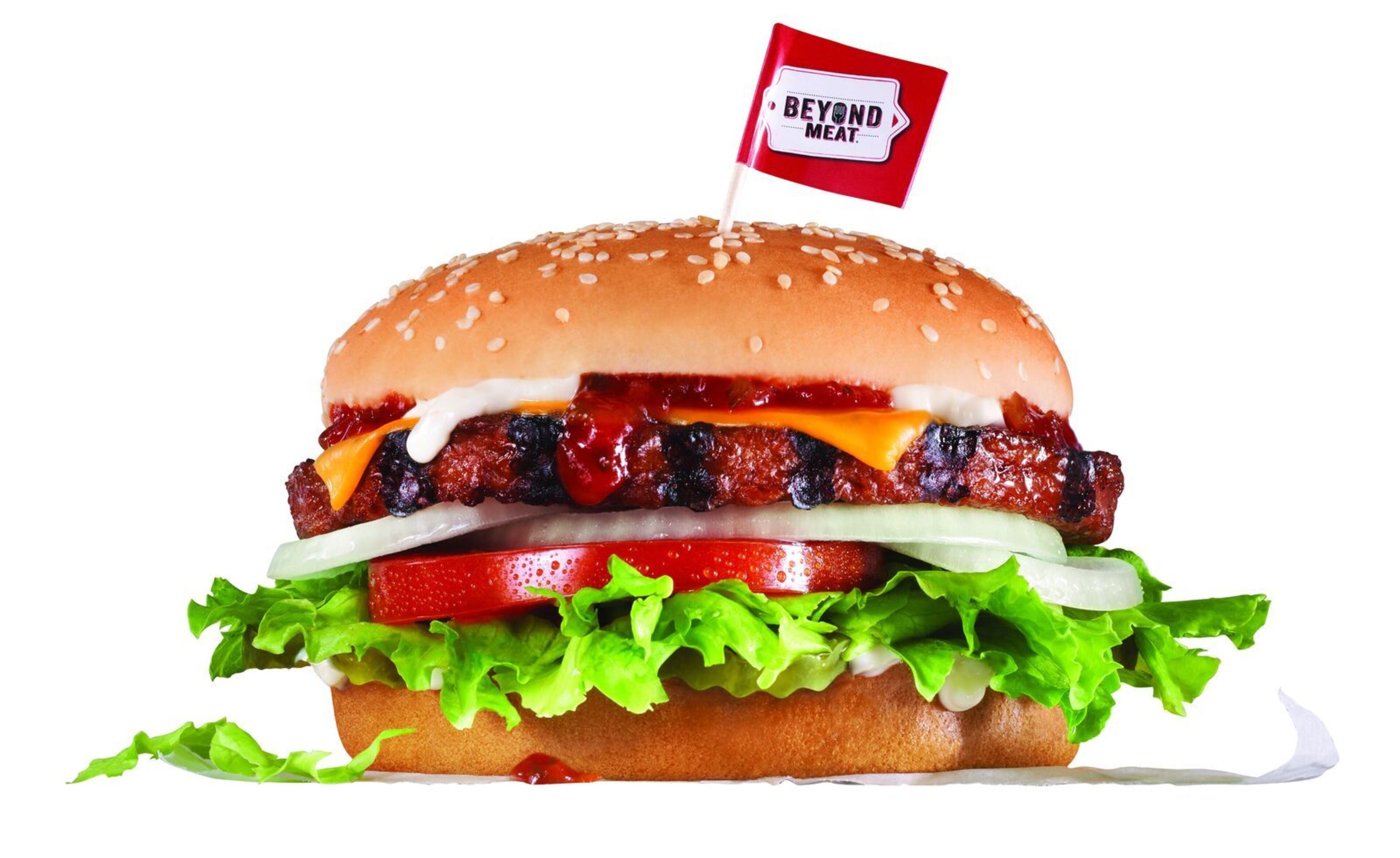Impossible! Vegan patty battles to become the new all-American burger

It was lunchtime on a mid-November day in 2017 when some office workers in Midtown walked out of their buildings to encounter a marketing team on the sidewalk handing out free burgers and T-shirts printed with a single word: Impossible.
The burger wasn’t made of meat, the promoters told them.
Impossible! It tasted just like the real thing. Many a carnivore was sold.
When the Impossible Burger made its metro Atlanta debut 18 months ago, the veggie burger that "bleeds" was only available at Grindhouse Killer Burgers locations and at now-defunct The Counter in Roswell. Since then, the meat alternative has been added to menus all over the city, from fast-casual joints like Wahlburgers, Buffalo's Café and Hudson Grille to fine dining restaurants like Mission + Market in Buckhead and, of course, vegetarian spots such as Café Sunflower and Go Vegetarian.
Diners are consuming the Impossible Burger in such quantities that California-based food producer Impossible Foods can’t make them fast enough. In this meat-loving nation, where the beef burger is considered the all-American contribution to global gastronomy, the unlikeliest of scenarios has unfolded: a vegan burger shortage.
Where’s the beef?
The Impossible patty is made of water, plant proteins, coconut oil and heme, a natural molecule that gives burgers their distinctive taste and is also found in plants. The patty is formulated to look and taste like a traditional red meat burger. California-based Impossible Foods has received more than $250 million in financial backing from Bill Gates, venture fund Temasek and several other businesses to bring the innovative product to the marketplace, and consumers are literally eating it up.
Mission + Market chef-owner Ian Winslade has had the Impossible Burger on his menu since opening the restaurant in April of last year. Until the recent shortage, he had been going through between 120 and 160 patties a week, each one topped with mashed avocado, Asiago cheese, and pickled red onions, served with a side of fries.
Prior to the shortage, Grindhouse was selling 500 Impossible Burgers per day, combined among five locations, its two airport spots withstanding.

But that's nothing compared to the off-the-chart sales at Slutty Vegan, where they sell 1,600 burgers daily. Making its food truck debut last year, followed by a brick-and-mortar in Westview in January, the provocatively named eatery has become the hottest vegan name in town. Lines have reached upward of 1,200 people, estimates owner Pinky Cole. The average wait time is two hours. The most popular burger, the Ménage à Trois, is an Impossible patty topped with vegan bacon, vegan shrimp, and a mix of lettuce, tomato and special sauce.
Besides matching the taste and texture of their meat counterpart and fitting the bill for health-minded eaters and those who adhere to a meat-free diet, plant-based burgers are touted as sustainable. It takes less water and less land, generates fewer greenhouse gas emissions and requires less energy to produce than a beef burger.
From a nutritional perspective, plant-based burger patties can come with a red flag. According to Kristen Smith, a registered dietitian with Piedmont Atlanta Hospital, some plant-based burgers have saturated fat and calorie amounts similar to that found in all-beef patties. In addition, the sodium content can be high, and the protein source can be highly processed. “It’s not necessarily a protein in its natural form,” Smith said.

Patties also vary in the level of vegetable ingredients, Smith said. Ones made with a higher vegetable content are lower in fat.
“It’s probably not something you want to eat on an everyday basis due to the calories and the fat content,” Smith said.
Conor Sen, a financial investment adviser and partner with New River Investments, compares the vegan burger craze to that of new technology products like the Tesla and the iPhone. “You can create this tech disruptive story around it. It’s healthier for you. Sustainable. It can bring about this new Utopia of food,” said Sen, whose office is based in Brookhaven. That sort of messaging is “a big part of it for this mass audience,” Sen said.
Fake meat meets fast food
The Impossible Burger has become so popular that fast-food chains are getting in on the plant-based patty action. A burger featuring the Impossible Burger patty has been on the menu at all Red Robin locations since April. White Castle offers an Impossible Slider. Having tested its Impossible Whopper in St. Louis to great aplomb, Burger King recently announced that it would soon be bringing the burger to other cities, including Columbus, Georgia, and to its 7,200 units nationwide by year's end.

Other chain restaurants — Burger Fi, Carl’s Jr., TGI Fridays and Del Taco, among others — also have plant-based proteins on their menus. However, they source from Impossible Foods competitor Beyond Meat. Founded in 2009 and headquartered in El Segundo, California, Beyond Meat manufactures a variety of meat alternatives: patties, sausages, even crumbles. The company went public in early May.
While some fast-food chains are partnering with companies like Beyond Meat and Impossible Foods as suppliers, others are creating their own special formula. McDonald's is experimenting with a vegetarian burger in Germany. Even Atlanta-based Chick-fil-A is mulling over whether to add vegan options and meat substitutes to its menu, Chick-fil-A menu executive director Amanda Norris told Business Insider in an interview earlier this month. But the company remains tight-lipped on the status of this initiative. "We're not ready to talk about it yet," Matt Abercrombie, the company's director for culinary commercialization, told the AJC soon after the Business Insider story was published.
Crisis over the craze
What folks are talking about is the crisis. On April 10 and again on May 1, Impossible Foods sent letters to food-service operators who use its products, explaining that the extraordinary growth of its flagship product, the Impossible Burger 2.0, which hit the market at the start of this year, had led to scarcity, and it was unable to meet the demands of the more than 7,000 restaurants that currently use its products.
The company also shared its plans to increase its production capacity at its Oakland, California, plant, as well as pursue more manufacturing locations.
It reassured its customers that: “Impossible Foods has a supply chain that is highly scalable, and the product is sourced from abundant ingredients. The company faces no insurmountable supply-chain constraints or fundamental bottlenecks; like many successful startups, we are facing short-term ramp-up challenges resulting from demand greatly outstripping supply.”

On May 8, Grindhouse Killer Burgers issued a press release. Owner Alex Brounstein apologized for the inconvenience but said the Impossible Burgers would be available regularly again soon. He encouraged “fans” to call ahead during the shortage.
When Winslade of Mission + Market contacted the company May 13 to check on the availability of the burger, he was informed via an email that “Foodservice distributors are currently extremely limited in what they are able to order and we are not in a position to guarantee or direct ship product” to him. The company, however, was willing to send him cards that guests could redeem online for limited-edition Impossible swag.
Winslade is not a happy customer. He noted that when he started carrying the product at Mission + Market a year ago, his was one of the few Atlanta restaurants using it. “Now, they are selling it at fast-food outlets. That dilutes the brand to the point that I don’t know if, when it comes back, I want to use it anymore. And who knows when it will come back?”
From his financial perspective, Sen, the investment adviser, isn’t sold on the vegan burger craze either.
When Beyond Meat went public on May 2, it was priced at $25 a share. The stock (BYND) is currently hovering around $78 a share. Sen said the company is projected to do $200 million in revenue for this year, yet Beyond Meat is valued around $4.5 billion — a way-above-normal ratio.

Beyond Meat is still early in its life as a business.
Beyond Meat sold about 15 million pounds of not-meat last year (most of that being its burger product), according to a company filing with the Securities and Exchange Commission. That contrasts with about 26 billion pounds of just beef produced by American meat companies a year earlier, in 2017, according to the North American Meat Institute, a national trade association.
Sen views the future of the alt-meat market as dependent on many factors, but especially consumer demand fueled by early adopters, vegans, “progressive people who what to feel environmentally conscious” and those who want to “be part of a trend,” he said. “The hot IPO (initial public offering) for Beyond Meat makes it a business craze. The shortage makes it a story.”
Sen likened the vegan burger shortage of today to that of Athens-based Creature Comforts’ flagship IPA, Tropicalia, a few years ago. “You couldn’t get it. It just makes you want it more,” he said.
There is a place where Atlantans who crave a plant-based burger are finding patties in stock: Slutty Vegan. Due to the Impossible shortage, Cole, the owner, hasn’t been able to send her truck onto the streets on a daily basis, but, she says, “We have enough to supply our customers at the restaurant.”
Get in line.
Staff writer Matt Kempner contributed to this article.
A SAMPLING OF PRICES
At Grindhouse Killer Burgers, the Impossible Burger patty is a $2.50 upcharge per patty. For instance, a “Junior” with a 1/4 pound patty is $4.99 for a beef patty and $7.49 for an Impossible Burger patty.
Prices for burgers featuring the Impossible Burger patty at Slutty Vegan are between $12-$19. The price includes fries.
An Impossible Burger at Mission + Market (with fries) is $19.
In its trial run in St. Louis, the Impossible Whopper costs $1 more than a Whopper, according to several media outlets.
RELATED:
Read more stories like this by liking Atlanta Restaurant Scene on Facebook, following @ATLDiningNews on Twitter and @ajcdining on Instagram.


